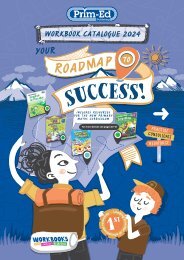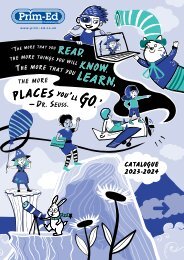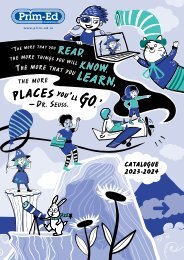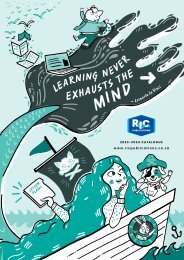PR-6171R Science A STEM Approach - Primary 2
Create successful ePaper yourself
Turn your PDF publications into a flip-book with our unique Google optimized e-Paper software.
<strong>STEM</strong> Teaching<br />
<strong>Science</strong>: A <strong>STEM</strong> <strong>Approach</strong>: Series Overview<br />
Teaching for <strong>STEM</strong> can be achieved through a cross-curricular approach to existing subject areas<br />
of the Irish curriculum. While science provides the dominant focus here, other curricular areas<br />
can be used to enhance pupil learning and reinforce concepts. Despite the fact that, at present,<br />
neither ‘Technology’ nor ‘Engineering’ are discrete subject areas in the Irish curriculum, teachers are<br />
constantly incorporating these areas in an informal fashion. Tablet computers, digital cameras and the<br />
Internet are commonly used by teachers in their classrooms to keep teaching and learning up-to-date<br />
with a constantly changing technological society.<br />
Mastery of a <strong>STEM</strong> <strong>Approach</strong> to <strong>Science</strong><br />
A mastery curriculum is based on the fundamental belief that all pupils are capable of learning<br />
anything if the learning is presented in the right way. Many pupils will experience barriers to learning<br />
that might prevent them from achieving the learning goal. A mastery approach allows teachers to<br />
really challenge pupils to solve problems whilst supporting them to overcome barriers in their way.<br />
Throughout this book, the term differentiation is used to provide guidance to teachers on different<br />
approaches to accommodate different abilities and learning preferences. Differentiation is not about<br />
lowering expectations of what ‘less able’ pupils can achieve, about simplifying activities or removing<br />
the challenge, it is about ensuring that all pupils have equal and fair access to the curriculum. Pupils<br />
who readily achieve the learning goal can be encouraged to work at greater depth through further<br />
research, learning and challenging activities.<br />
Some strategies for differentiation in this book include:<br />
• Changing the way pupils need to show their observations or their learning.<br />
• Using a range of different resources to overcome pupil difficulties.<br />
• Learning through collaboration, enabling pupils to support each other in the learning process.<br />
• Recognising that pupils have different ways in which they learn.<br />
• Coaching children through questioning, providing clues or comments, enabling them to reveal<br />
their own knowledge, skills and understanding.<br />
• Ongoing assessment that allows the teacher to adapt and modify activities to ensure maximum<br />
learning growth for all.<br />
Children learn most effectively when their experiences are based around their interests and are<br />
filled with activities that are both relevant, engaging and meaningful. This book aims to ensure<br />
that by providing such activities, teachers are able to support pupils to achieve mastery of science,<br />
technology, engineering and mathematics.<br />
Viewing sample<br />
Prim-Ed Publishing – www.prim-ed.com 978-1-912760-15-2 1st <strong>Science</strong>: vii<br />
CLASS<br />
A <strong>STEM</strong> AP<strong>PR</strong>OACH


















